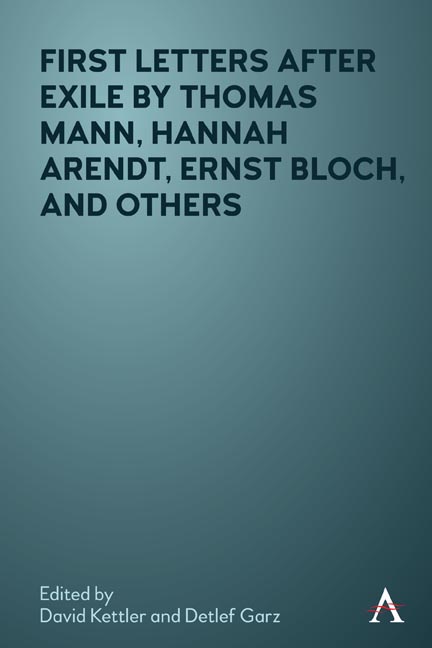Book contents
- Frontmatter
- Contents
- Preface
- Chapter 1 The “First Letters” Exile Project: Introduction
- Chapter 2 “That I Will Return, My Friend, You Do Not Believe Yourself ”: Karl Wolfskehl – Exul Poeta
- Chapter 3 “I Do Not Lift a Stone”: Thomas Mann’s “First Letter” to Walter von Molo
- Chapter 4 Faust Narrative and Impossibility Thesis: Thomas Mann’s Answer to Walter von Molo
- Chapter 5 “That I Am Not Allowed for a Moment to Forget the Ocean of Blood”: Hans-Georg Gadamer and Leo Strauss in Their First Letters after 1946
- Chapter 6 Return into Exile: First Letters to and from Ernst Bloch
- Chapter 7 A Postwar Encounter without Pathos: Otto Kirchheimer’s Critical Response to the New Germany
- Chapter 8 An Exile’s Letter to Old Comrades in Cologne: Wilhelm Sollmann’s Critique of German Social Democracy and Conception of a New Party in Postwar Germany
- Chapter 9 First Letters: Arendt to Heidegger
- Chapter 10 Denazification and Postwar German Philosophy: The Marcuse/Heidegger Correspondence
- Chapter 11 “It Would Be Perhaps a New Exile and Perhaps the Most Painful”: The Theme of Return in Oskar Maria Graf ’s Letters to Hugo Hartung
- Chapter 12 Social Constellation of the Exile at the End of the Second World War and the Pragmatics of the “First Letters”: An Objective Hermeneutic Structural and Sequence Analysis
- Notes on Contributors
- Index
Chapter 6 - Return into Exile: First Letters to and from Ernst Bloch
Published online by Cambridge University Press: 25 February 2022
- Frontmatter
- Contents
- Preface
- Chapter 1 The “First Letters” Exile Project: Introduction
- Chapter 2 “That I Will Return, My Friend, You Do Not Believe Yourself ”: Karl Wolfskehl – Exul Poeta
- Chapter 3 “I Do Not Lift a Stone”: Thomas Mann’s “First Letter” to Walter von Molo
- Chapter 4 Faust Narrative and Impossibility Thesis: Thomas Mann’s Answer to Walter von Molo
- Chapter 5 “That I Am Not Allowed for a Moment to Forget the Ocean of Blood”: Hans-Georg Gadamer and Leo Strauss in Their First Letters after 1946
- Chapter 6 Return into Exile: First Letters to and from Ernst Bloch
- Chapter 7 A Postwar Encounter without Pathos: Otto Kirchheimer’s Critical Response to the New Germany
- Chapter 8 An Exile’s Letter to Old Comrades in Cologne: Wilhelm Sollmann’s Critique of German Social Democracy and Conception of a New Party in Postwar Germany
- Chapter 9 First Letters: Arendt to Heidegger
- Chapter 10 Denazification and Postwar German Philosophy: The Marcuse/Heidegger Correspondence
- Chapter 11 “It Would Be Perhaps a New Exile and Perhaps the Most Painful”: The Theme of Return in Oskar Maria Graf ’s Letters to Hugo Hartung
- Chapter 12 Social Constellation of the Exile at the End of the Second World War and the Pragmatics of the “First Letters”: An Objective Hermeneutic Structural and Sequence Analysis
- Notes on Contributors
- Index
Summary
If one returns, he cannot be certain that it is forever. Because it always remains possible that he must return once again. For Ernst Bloch, the final return repeatedly postponed itself. His life consisted, one could almost say, of a series of exiles. In the First World War, as one of the few German intellectuals who emigrated to Switzerland, during National Socialism, then to Prague and the United States, afterward returned “back” to the GDR, he found his last exile, at the time of the building of the Berlin Wall in the Federal Republic, someone that the socialists had to accept because he was considered politically too unreliable in the “real” socialism of the East.
In keeping with this, Bloch had written numerous, quite various kinds of “First Letters.” One of his First Letters after the end of the First World War is an open one: still from Switzerland, Bloch writes (together with Hugo Ball, Karl Ludwig Krause, and Hans Schlieben) of the “moral deed” necessary for “the interests of a genuine German Republic.” He emphasizes his status as exile and draws on this as justification for demanding precisely this “moral deed” (that is, the recall of the old imperial elites). In 1918, the hope for democracy, perhaps even of a socialist turn, could permit a return with a certain pathos; 30 years later, after the experience of eliminatory mass anti-Semitism, such a position was possible only at the price of denying reality. Bloch wrote at the time that while anti-Semitism in general concerned him, it was altogether impossible among worker-students in particular.
Only a few years later, this denial revenged itself, as the reality of the GDR caught up with him. Bloch returned once more, this time to the Federal Republic—a return that only led once more to a new exile. For politically, the Federal Republic in the Adenauer years is no less an alien land for Bloch than the GDR had been. Still, he was now allowed to teach at the well-regarded University of Tübingen and freely to express his opinion.
- Type
- Chapter
- Information
- Publisher: Anthem PressPrint publication year: 2021



